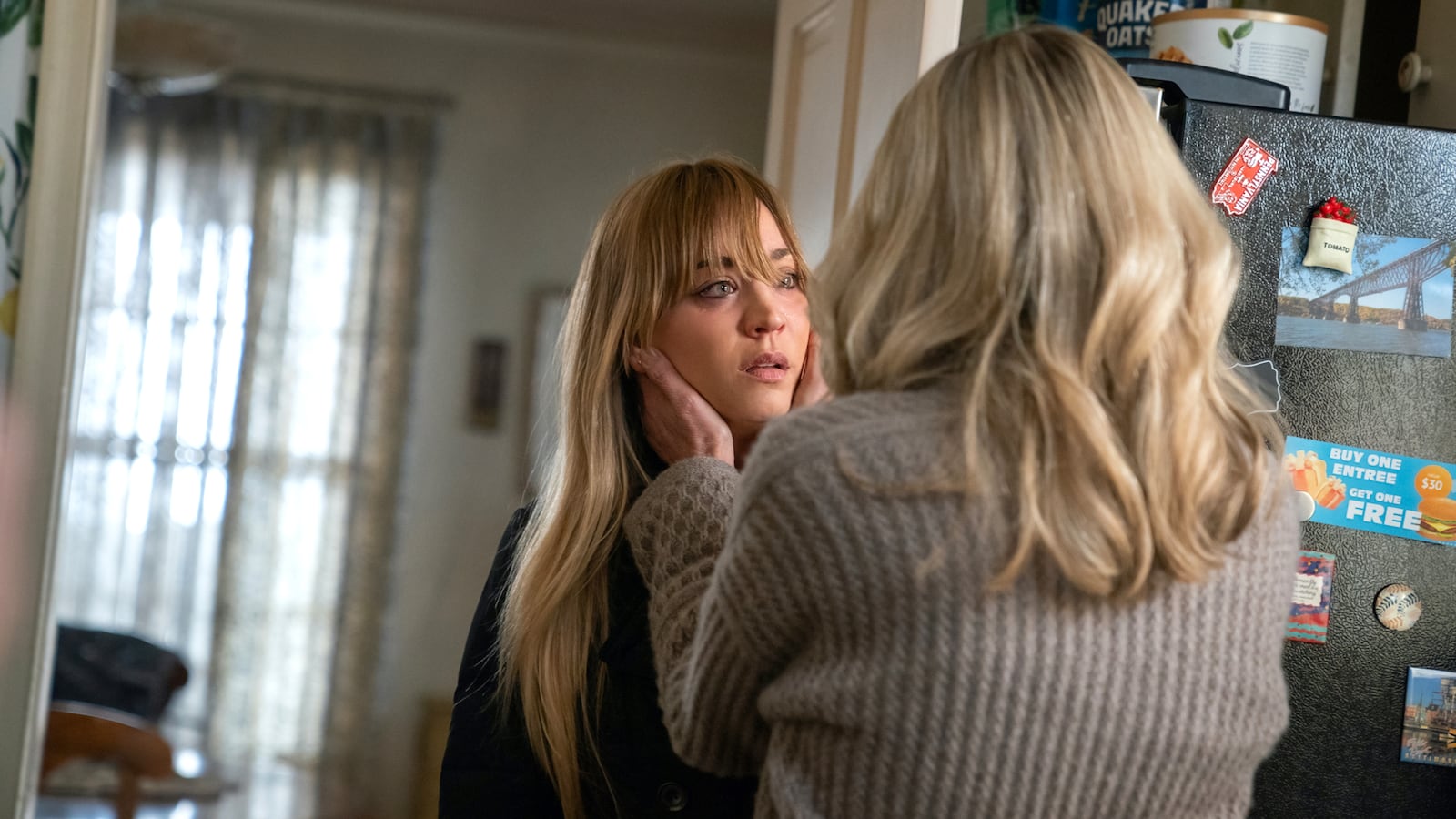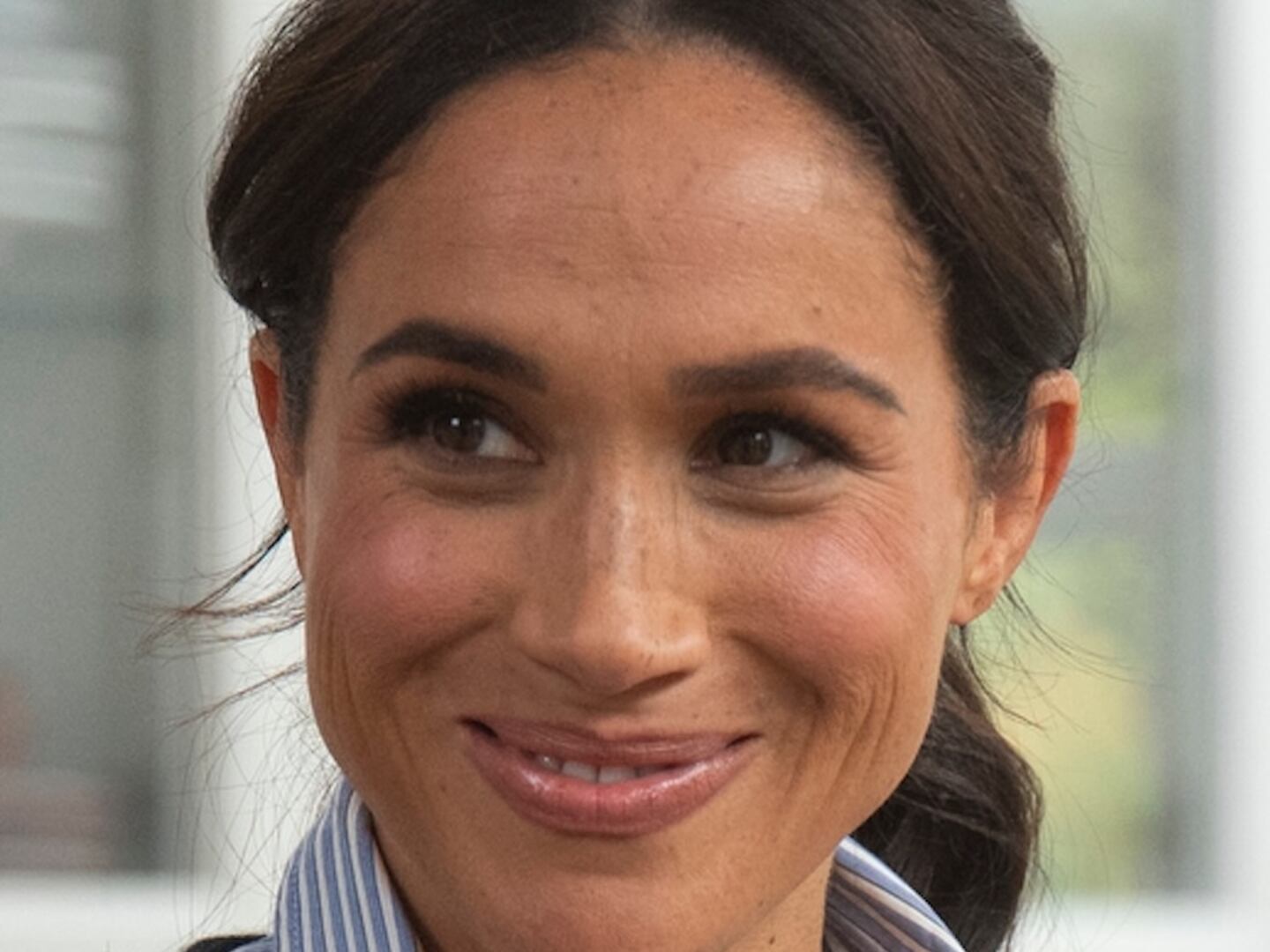No one knew the slap was going to happen.
This week’s episode of The Flight Attendant was all about dark, startling surprises—and we’re not even talking about when North Koreans show up to chase the leading lady through the woods.
(Warning: Spoilers lie ahead for “Brothers & Sisters,” the sixth episode of The Flight Attendant Season 2, which hit HBO Max Thursday.)
Cassie (Kaley Cuoco) stunned her brother Davey (T.R. Knight) with the revelation that, after celebrating a year of sobriety, she had relapsed the night before their trip back to their hometown. When they arrive at their childhood house, Cassie’s eyes widen in shock when the door opens and her mother (Sharon Stone), with whom she has an estranged, acrimonious relationship, is standing there. Oh, and then there’s the slap.
“I’ll never forget when it happened,” Kaley Cuoco tells The Daily Beast. “You would have thought the life got sucked out of that entire room. No one moved. Everyone had their hands over their mouths. And they just kept rolling. I don’t know if I’ll ever experience such a true moment in shooting something ever again.”
This season of The Flight Attendant continues to be a strong, fizzy cocktail mixing the thrills of Cassie’s globe-trotting espionage hijinks with the sardonic, quirky wit of its main characters. It’s also traveled deeper into the struggle—and sometimes painful reality—of a sobriety journey. Cassie starts the season determined to turn over a new leaf. She’s going to AA, but is constantly battling the temptation to drink—especially as visions of her formerly boozy self bait and taunt her.
Last week’s episode, “Drowning Women,” finds Cassie, who had just received her one-year sober chip, going on a violent bender, destroying her house and drunk-driving to the beach, where she has an emotional meltdown and calls her sponsor (Shoreh Aghdashloo) in shame. It leads to a wrenching heart-to-heart, powerfully acted out by Cuoco and Aghdashloo.
“Brothers & Sisters” finds her grappling with the consequences of her relapse, and the truth that it might happen again: “I thought that if I quit drinking all my problems would go away, but they’re all still here.” When she and Davey go to their father’s grave, she breaks down while reading a “forgiveness letter,” explaining how much she resents that he introduced her to drinking and is partly responsible for her being an alcoholic adult. Slipping “makes me hate myself,” she says.
The surprise that her mother is at the house when she and Davey arrive to go through their belongings sparks an explosive confrontation in which they excavate decades of past trauma. Cassie apologizes for being a “shitty daughter,” but her mother counters: “Nobody is mad at anybody for what you do when you’re little. It’s what you do as an adult that matters.” She starts listing all the horrible things that Cassie has done, each one cracking Cassie more and more until she finally shatters.
On her way out, she takes a quivering Cassie’s face in her hands and says, “I love you, but I don’t like you at all.” She gives her two love taps on the cheek, and then slaps her, leaving Cassie shell-shocked.
“We knew we had a lot of comedy up until these episodes, so we knew we earned it,” Cuoco says. “This was a big deal for me this season. Every email, every call, every everything, I kept saying, ‘Guys, go with the comedy take. We need the comedy.’ I was really pushing comedy because that, at the end of the day, is what we are. I was worried it was starting to get too dark, but after watching the first few episodes, the comedy really was there. So we earned five and six.”

Kaley Cuoco and T.R. Knight in The Flight Attendant Season 2 .
HBO MaxFor the former star of The Big Bang Theory, it’s the most dramatic work that she had ever done. Her natural kookiness and inclination for screwball comedy never vanished in the episodes—her wryness in scenes with Zosia Mamet’s Annie continues to be hysterical, and the physical comedy of her and Knight running from the North Koreans was perfect. But the rawness with which she mined the emotion in these two episodes, particularly in that kitchen scene with Stone, is the performance of her career.
As she tells The Daily Beast, going through her recent divorce during production, Stone’s intense interest in her life while on set—“I felt like I had done 18 hours of therapy”—and an acting tip from Stone that had the two of them on set screaming like goats before a take all worked together to help nail the performance. “It felt completely different,” she says. In turn, she and the series are also depicting one of the most realistic and honest depictions of alcoholism and sobriety there’s been in a TV show.
“I was shopping the other day, and someone came up to me and pulled me aside and said, ‘I just have to tell you: I’ve been watching your show. I’ve been sober for 17 years, and you got it right,’” Cuoco says. “I just got this chill down my body. It was so nice to hear, and I said that means so much to me. I said, listen, I am not a sober person. I said I had to figure out and learn that everyone’s sober journey is different to them. And so I just took that as, OK, what’s my idea for Cassie’s journey? Looking back into her family and her trauma, what is she going through?”
There are lines in the two recent episodes that are remarkably frank about what sobriety means for a person like Cassie. In one scene, Cassie is talking to Annie and says she wants to drink. Annie recoils and begs her not to say things like that, but Cassie pushes back, saying it’s true and it will always be true. In another, Davey asks Cassie if she’s OK after her relapse and bender. “No,” she says. “But I’m not going to drink again. At least I’m not going to drink right now.”
“This is going to be a constant struggle for her and she’s finally not at the beginning,” Cuoco says. “She’s finally being honest about, no, I’m fucked and this is how I feel and this is going to always be my challenge in my life.”
The most brutal—and therefore most revelatory—exchange comes in the scene with Stone in the kitchen.
Cuoco says it was Stone who actually reached out to production and expressed interest in being on the show. “She has a lot of family members and stories in her life that revolve around sobriety and family that has struggled with this. She really connected to this mother and to our story.”
She remembers the first day Stone arrived on set. She and Knight were filming a scene in a car when they heard over the radio, “Ms. Stone has landed.” They had a mini freakout and wondered how Stone would be when they met, as everyone has different comfort levels with touching and interaction during COVID-19. She saw them in the car when she arrived, ran over, and flung her entire body through the open window, wrapping her arms around the two of them and squeezing their faces together. “My children!” she said.
Cuoco is a producer in addition to starring in The Flight Attendant, and normally even her shooting days require her to be on her phone putting out fires or in the edit bay looking at dailies. But she wasn’t going to do that on a day when she had a scene that was so big and emotional—and was with Sharon Stone.
They spent their downtime not just discussing the scene, but talking intimately about each other’s lives. “Really intense conversations,” Cuoco says.
“She was like a therapist. I was at the peak of my divorce during these scenes, and she was really asking me a lot of questions about honesty and being honest about myself. She asked if I was honest in the relationship and what happened. I mean, digging deeper than even my real therapist had done at that point. All my emotions were coming out. They were about what I was going through, but they were so real.”
Which all leads to the slap.
As the scene was scripted, Stone was meant to say the line, “I love you, but I don’t like you at all,” and then leave the kitchen. After a handful of takes, “something came over” Stone, Cuoco says, “and she whacked me. It was so shocking. I’ve never been hit in the face. I cried so hard after. It was so good for the scene.”
Even to a viewer, the moment is a jolt. It seems to be a tender interaction, with a mother caressing her crying daughter’s face. Then comes the slap.
The Flight Attendant is never about tying things up in a bow. It turned out that improvised smack was exactly what the scene needed to telegraph that family dynamic in a more authentic way, Cuoco says. “It shows all the trauma and all the fucked-up things that hasn’t been dealt with.”
Similarly, it was important that the slap not be the end of the storyline. You see Cassie staring out the window at her mother after she leaves, who is sitting in her car sobbing.
“It’s authentic,” Cuoco says. “It makes you think of your own families. Especially during my divorce, I feel like you just don’t know what people are going through. I really learned that over the past year or two. Every person you come in contact with, whether they have a certain attitude or maybe they’re having a bad day. My eyes have just been open to that. You just don’t know what someone is going through. These characters, they’re going through so much shit all the time.”

Sharon Stone in The Flight Attendant Season 2.
HBO MaxAll of this shouldn’t obscure the fact that, even with the weight of these issues and storylines, The Flight Attendant is still a very funny show. You’ll cry—a lot—in these recent episodes. But you’ll still laugh a lot, too.
It’s a tricky balance to strike. “I never heard the word ‘tone’ more than I had during Season 1,” Cuoco laughs.
She remembers that, for every scene, they would do dozens of wildly different takes, every which way she could think of. “I would do a comedic take where I was literally Lucille Ball and then I would do the next take where I was crying. And then I do the next take where I was silent because I had no idea how we were going to puzzle pieces together.”
The end puzzle, it turns out, worked. And that’s why this season was able to push as far as it does in the intensity and the pathos of Cassie’s sobriety, dark as that might be, and then pivot immediately back to the sensationalism and thrills of the CIA storyline.
“We felt so much more free this year to even push it farther and be weirder,” Cuoco says. “Our show was weird. That’s what I love about it. It’s totally weird. It’s funny. You will cry. You will laugh. But it’s fucking weird.”






